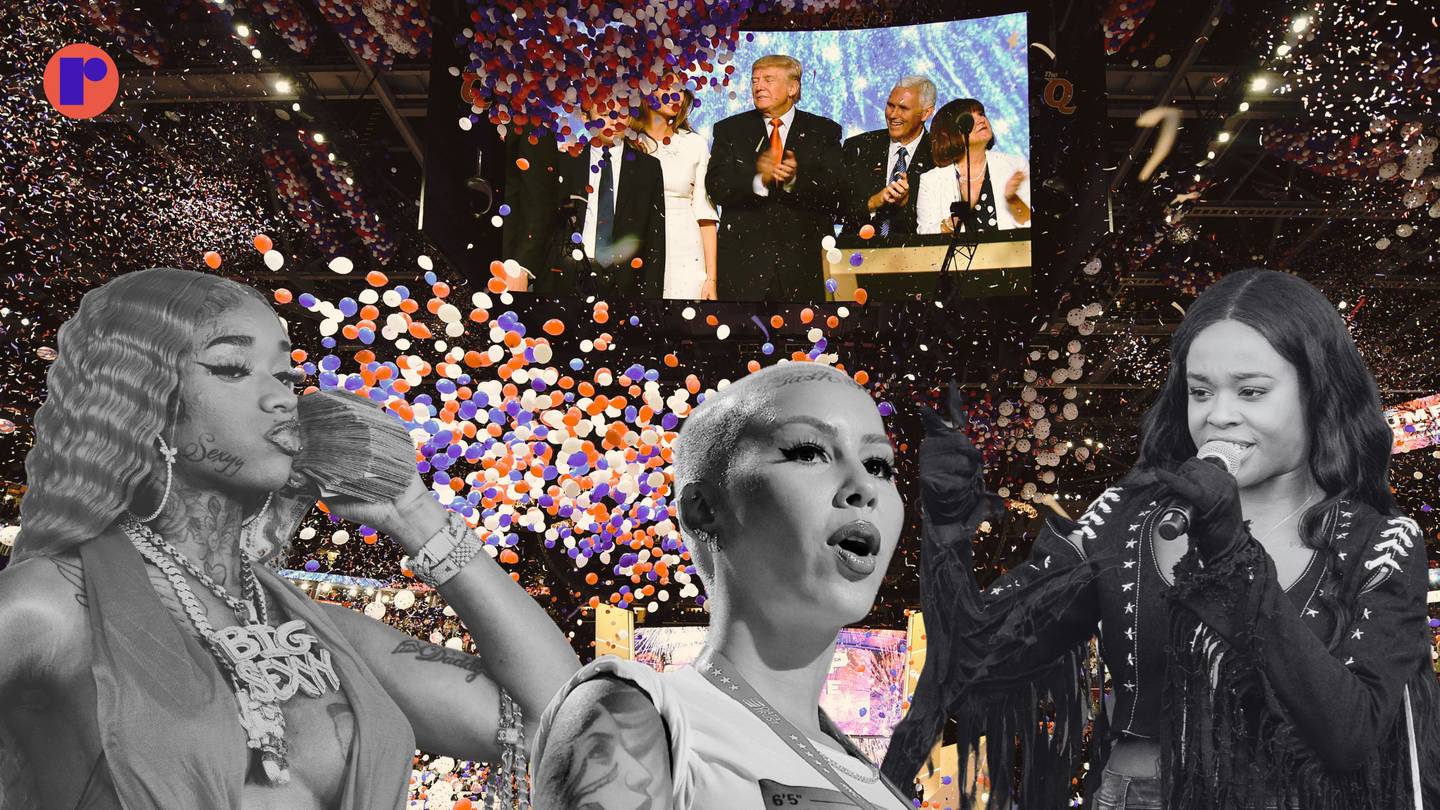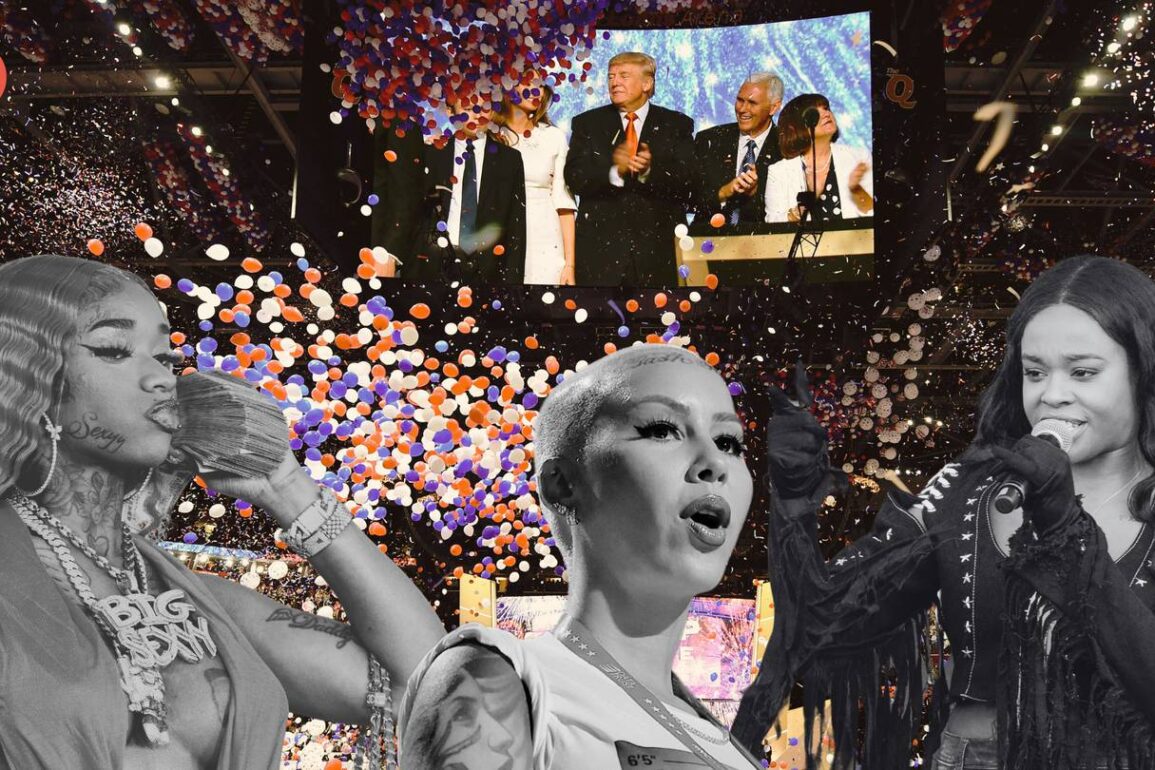
Even before Donald Trump’s assassination attempt on Saturday galvanized his cult following, solidifying his status as a resilient and untouchable figure, a notable shift was occurring within the hip-hop community as some artists began to join the Trump bandwagon.
A since-deleted Forbes article titled, “Will surviving gunfire be Donald Trump’s next appeal to Black voters?” has gone viral following a shooting at a Trump rally on Saturday. The former president, who recently declared that his criminal indictments have boosted his support from Black voters, is always on the prowl for ways to pander to the demographic. One of his tactics seems to be embracing hip-hop, especially women.
In 2016, Trump called Nicki Minaj “fantastic” and expressed his excitement for her performance at the Time 100 Gala. During her performance, the rapper declared, “I’m very political…I would like to dedicate a song (”Anaconda”), just in the spirit of unity, to Joe Biden and Donald Trump.” Nicki Minaj has maintained relatively mixed feelings about the president, criticizing his policies on immigration, but also crediting “some points he has made” and calling him “hilarious.”
Some female rappers, however, are much more decided about their feelings for Trump. Azealia Banks, who once proudly called Trump her “hero” after his 2016 victory, is reiterating her support for the twice-impeached, convicted former president. On July 11, she reposted an Instagram story of her and a friend at a rally captioned, “Trump invited the gang.”
Banks joins model Amber Rose and rapper Sexyy Red in a recent slew of endorsements from women with deep ties to hip-hop culture. Rose, known for organizing a 2015 SlutWalk to protest victim shaming, raised eyebrows with her recent support for Trump, who was found guilty of rape just last year. In May, she posted a picture on Instagram embracing the former president and former First Lady Melania Trump, captioned “Trump 2024.” Last night, the model give a pro-Trump speech, defending him against racism and ‘left-wing propaganda’ at the Republican National Convention.
This past October, Sexyy Red announced her support for Trump. “I like Trump…They support him in the hood,” she explained on the This Past Weekend podcast. This past June, after seemingly distancing herself from Trump, she performed with a giant MAGA-inspired hat, branded “Make America Sexyy Again.”
As November approaches, a disturbing pattern emerges: women in hip-hop are becoming cheerleaders for the conservative party. How did we get here?
Endorsements from Black hip-hop stars have long been a secret political tool for conservatives. When influential Black celebrities parrot problematic conservative talking points, it can lend legitimacy to rhetoric often dismissed for being anti-Black. Black elites may be attracted to conservative promises of tax breaks for the wealthy, and economic investment in Black communities, like those made in Trump’s Platinum Plan.
In the past years, we have seen a rise in male hip-hop stars such as Kanye West, Snoop Dogg, Waka Flocka Flame, Chief Keef, and more asserting their support for Trump. Even rapper YG, who penned the 2016 hit “F*ck Donald Trump”, has recently appeared more sympathetic to the former president. Rappers Kodak Black and Lil Wayne were even pardoned by the president after praising his agenda for criminal justice reform. It is even rumored that rapper 50 Cent will be in attendance at the RNC this week after memeing the former president’s shooting with his song. High-profile endorsements from hip-hop elites could potentially attract Black voters, who overwhelmingly lean Democrat, to conservatism.
While many men in hip-hop have publicly supported the disgraced president, so have a rising number of women. Endorsements from women in hip-hop have the potential to be twice as impactful—creating cover for Trump’s misogyny, in addition to his racism.
Recent Trump endorsers like Azealia Banks, Amber Rose, and Sexyy Red are known for their outspoken personalities, unapologetic views on sexuality, and ties to Black American popular culture. Their bold opinions, provocative lyrics, and status as Black and mixed women clash with the traditional, white femininity conservatism promotes. Yet, for all their “disqualifying” traits, they are still being embraced in conservative spaces. Why do these women appeal to white conservatives who might otherwise turn their noses up at them?
It may be hard to envision how Sexyy Red, for example, fits into the Trump political circus, but her participation benefits conservatives in several ways. The more obvious benefits are creating shock value and engagement, given that these spaces usually do not welcome women like her, and potentially attracting new voters to the party with her massive influence.
But there might be something else at play here. As Trump vows to “make America great again” and return to more conservative values, why not start with the “uncontrollable” Black woman?” “Taming” Black women has long been a concern since chattel slavery, and in the modern day, policing Black women’s self-expression and bodies remains a popular pastime. For Trump and the Republican party, the spectacle of “reining in” ungovernable Black women might be a quasi-religious, ‘manifest destiny’ attempt at “saving” society’s most “irredeemable”, by enlisting the people whom racism and misogyny have made social pariahs.
And what better place to find women for this redemption project than hip-hop? Since its inception, the genre has been a “f*ck you” to the establishment, boldly critiquing the government and police. From 90s anthems like Public Enemy’s “Fight the Power” to modern hits like Kendrick Lamar’s “Alright,” hip-hop boasts an enduring tradition of resistance.
So what does it mean, then, for women in hip-hop to flirt with conservative ideals? Well for the white Trump voter, it may signal a long-awaited cultural baptism or correction, amid fearful debates about women having “too much” freedom.
As we near the election, more women in hip-hop might declare their support of Donald Trump. We must look beyond our initial shock to truly uncover the more insidious agendas at play.
TK Saccoh is the writer and content creator behind the digital feminist hub The Darkest Hue, where she ignites critical conversations about colorism, anti-blackness, and misogynoir. Launched in 2020, this space amplifies the voices of Black women and femmes, which are often silenced.
This post was originally published on this site be sure to check out more of their content.





